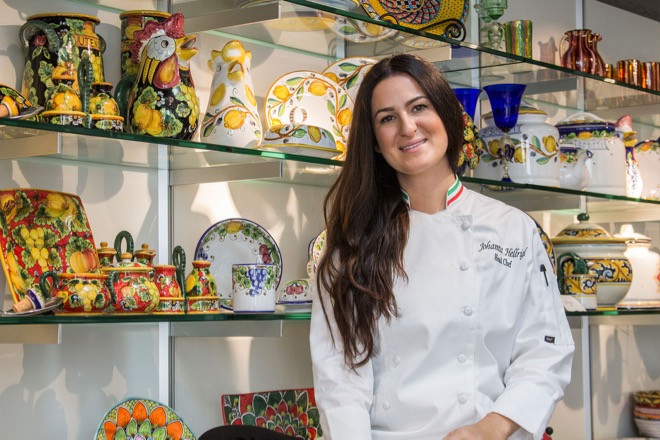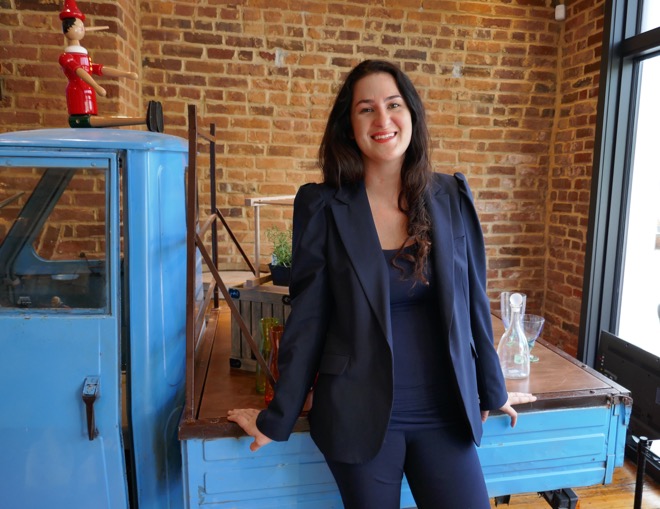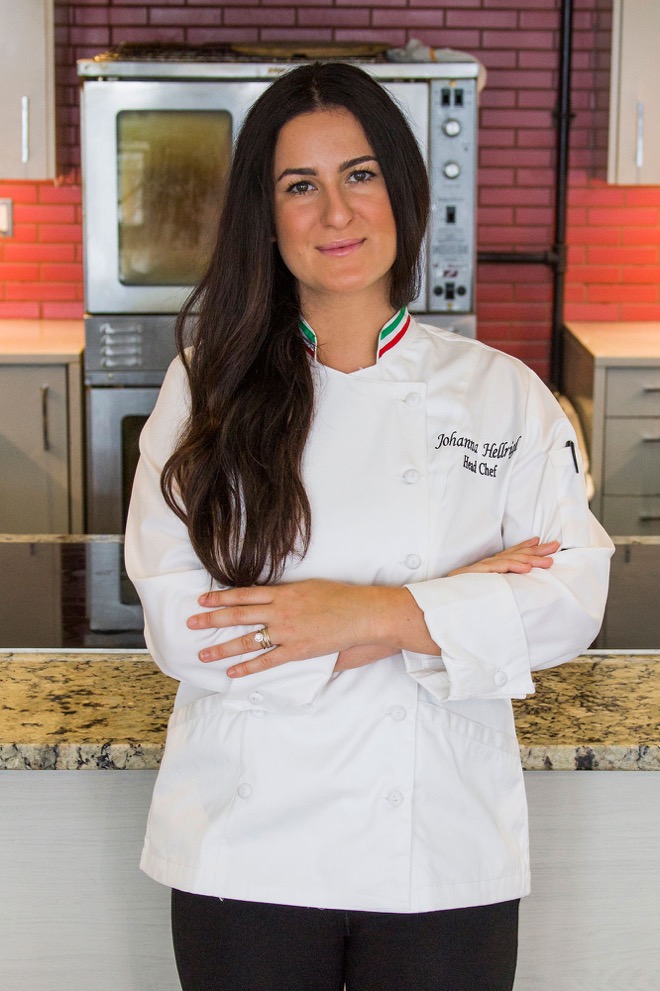Welcome to Johanna Hellrigl's Table

When The Georgetown Dish caught up with Executive Chef Johanna Hellrigl, she had just returned from her Portofino wedding, a place she lovingly (and luckily) called home. Serendipity brought her to Via Umbria several months prior when she wandered in and perused the shelves. The products and aromas reminded her of home. Soon she had donned her chef's apron and dazzled Suzy and Bill Menard.
Look for Johanna's official debut September 9th. For now, learn a bit more about her here before stopping by Via Umbria to sample Johanna's culinary creations.
Have you always wanted to be a Chef?
Yes and no. I was born into a family with a Chef for a father and grew up in the restaurant industry so I’ve always had a deep admiration and respect for chefs and restaurateurs. Rather than following in the footsteps of my family, however, I was determined to prove I could do my own thing and seek out other passions. For four and a half years, I worked for a democracy building organization where I focused on empowering women from around the globe to increase their political participation. Through that experience I was fortunate enough to travel to every region and meet unique individuals. This had the added bonus of exposing me to the flavors, cuisines and cultures of many different countries.
When I wasn’t traveling, I found my solace in cooking. I would come home from a long day at work, excited to walk into the kitchen and create something. Cooking allowed me to use a different part of my brain and it became a way for me to relax and express myself. I sought out opportunities to cook for other people, inviting friends over to share a meal and taking the time to find my own voice in the kitchen. Cooking for my friends and for my (now) husband allowed me the time to explore this pursuit, and helped me realize that it wasn’t just something I did, it was something I had a real gift for, and a unique perspective on. It was then that I decided that this was the passion that I should be pursuing.
How did you start cooking?
My father was a world-renowned chef from Northern Italy and one of my first gifts was a [rubber] knife. One night he was cooking at home and handed me a zucchini to play with in the meantime with my rubber knife. I apparently cut the zucchini perfectly and my father was shocked- he said to my mother, this one will end up in the kitchen. Although my father passed away when I was only four years old, my mother embodied his spirit, continued to pursue his endeavors and kept his American dream alive through his restaurant in New York City. Her perseverance, despite his absence, in such a tough industry is what makes her my role model to this day.
Through the restaurant, I was able to learn the art of cooking from those my father entrusted with his recipes and techniques. Every Saturday was the highlight of my week. My mother would bring me to the restaurant, dress me up in my chef outfit and I would be placed in the pastry section (the other sections were too dangerous and fast paced for my age). I would help in any way I could and soak up all the lessons there were to learn. The racks of apple strudel to the utilization of a blow torch for the crème brulee are images that are ingrained in my memory. Years ago, I realized that my desire to bake as much- if not more than- I cook must come from the decade-worth of Saturdays spent in the pastry section.
How would you describe your style of cooking?
I think the most important thing when you cook is having respect for food and for the ingredients. Cooking shouldn’t be about piling things on top of each other to create an end result, but rather finding ways to highlight fresh flavors and make them complement each other as well as enhance their flavors. I’m a huge proponent of community supported agriculture and because of this I find myself drawn to seasonal ingredients, which is something that is central to Via Umbria’s philosophy and mission. My favorite challenge is to create menus based on what is available and I think that is where a chef’s creativity is really seen.
While my background has exposed me to many spices and unique flavors, many of which I use and love, I find myself always drawn back to Italian cooking and the history behind it. Traditional recipes and the Italian style of cooking is not about creating things that are complex or complicated, it’s about enhancing the flavor of ingredients by focusing on simplicity, balance and freshness.

How important are ingredients to your recipes?
In Italian cooking, and in my mind, ingredients are everything. Starting with quality ingredients is what makes or breaks a dish and I am fortunate at Via Umbria to have access to the highest quality, authentic Italian ingredients. Honestly, if you can’t actually be cooking in Italy, this is the next best place.
I strongly believe that you also get out of a dish what you put into it. I would rather take the time to blanch and peel fresh tomatoes than use canned tomatoes because the flavor is completely different, and to me that flavor is worth the extra effort. That having been said, when looking at a recipe, I think sometimes people get too worried about following the directions instead of trusting their instincts. I often compare cooking with a recipe to driving with a GPS system to navigate you: Nowadays when you drive you are completely reliant on a GPS system to get you to your destination. By just following each step of the navigation, you sometimes take the longer route, but because you’re following the directions so closely you don’t even realize that there might be a better way. However, if you take a step back and start to study the directions and the roads, you become more confident in creating your own directions and navigating yourself to find the what works best for you. I view cooking in much the same way. Study the ingredients in the recipe, familiarize yourself with what they are and what they taste like, figure out why you put them together and how the combination changes or enhances their flavors, and you will be more likely to understand the amounts and purpose of each ingredient. This in turn will allow you to experiment with the recipe, become more confident in the kitchen, and create a style of cooking that works for you.
What do you always keep the ingredients on hand for?
Homemade tomato sauce. It’s one of the easiest things to make, and yet something that makes all the difference when you’re cooking. I have never bought it from a jar and never will.
How did you end up at Via Umbria?
It honestly was a “right place at the right time” scenario. I was wandering through Georgetown looking for ingredients and inspiration for recipes and I happened upon the store. As soon as I walked in I was impressed by the selection and authenticity of the products- it honestly felt just like shopping in Italy. I walked from section to section, finding unique products from all over Italy, admiring the butcher counter and the cheesemonger’s selection, but when I walked into the Wine Room I was hooked. I found bottles from small production wineries in Alto Adige and Liguria and felt instantly that I had found a little piece of home in Washington. When I started talking to (owners) Bill and Suzy Menard, it became clear that we had a similar mission and passion- I am very dedicated to bringing awareness of Italy and what authentic Italian cuisine means, rather than the Americanized Italian foods, products, and ideas you see so often, and it was clear right away that this was something we shared.

Via Umbria uses the word “simple” to describe their food - how would you describe “simple”?
Italians have a tradition of making good food and respecting flavors and I think that’s a large part of what draws me to Italian cuisine. Simple doesn’t mean basic or bland, it means food that is organic in its composition. Overcomplicated food has been done- there are so many restaurants, amazing restaurants, where you can go and have a once in a lifetime meal with all the bells and whistles, but I want my dishes and the food we bring to Via Umbria to be something that you trust to always impress yet comfort your palate. We do unique and different things compared to other Italian restaurants in DC, but our primary focus is to draw people with our ingredients, flavors and the experience of community we have at Via Umbria. Food is the the tangible part of a meal, but there is so much more that goes into the overall dining experience. For me, mealtime is about the act of eating but also about the environment, presentation, and the people with whom you enjoy a meal, and none of that should be fussy.
What role does wine play in your meals?
If you ever have a meal in Italy or with an Italian, it’s easy to see that wine is an important part of the experience. Just as coffee is an important part of your breakfast in the morning, alcohol, whether it be beer, wine, or a spritz, is an important component of your evening meal. Because of this, and this idea that what you are drinking should enhance and bring complexity to your food, a lot of Italian winemaking ties in so well with regional foods. The winemakers in particular regions are creating things that taste good, but are also creating things that pair well with the foods that they are eating. Because of this, wines are what bring in the last piece of the puzzle when it comes to building the flavors of a meal and we have worked hard at Via Umbria to build a wine list and a retail selection that spans all of Italy’s regions, not just the most popular and most well-known, and to share our expertise with our dinner guests and retail customers to ensure they pick just the right wine for their meal.
What’s it like to cook in an open kitchen?
I’m incredibly passionate about food and bringing good food to people. I want to use my cooking to raise awareness of how easy authentic Italian cooking can be if you approach it the right way, and to empower people in the kitchen. Working in Via Umbria’s open Laboratorio kitchen is the perfect format for me because it really gives me the ability to engage with people and open up these conversations. Cooking in front of people, interacting with groups when they come in to eat, and walking people through the food as it’s served allows me to bring more to the table than just food- meals in the Laboratorio become more about the experience of eating than a typical restaurant. Every night I create a different menu which allows me to engage people in a new conversation and expose them to new regions and dishes. I get to challenge myself to explore different regions of Italy and the Italian landscape while creating an evening that is unique and memorable for our guests.
